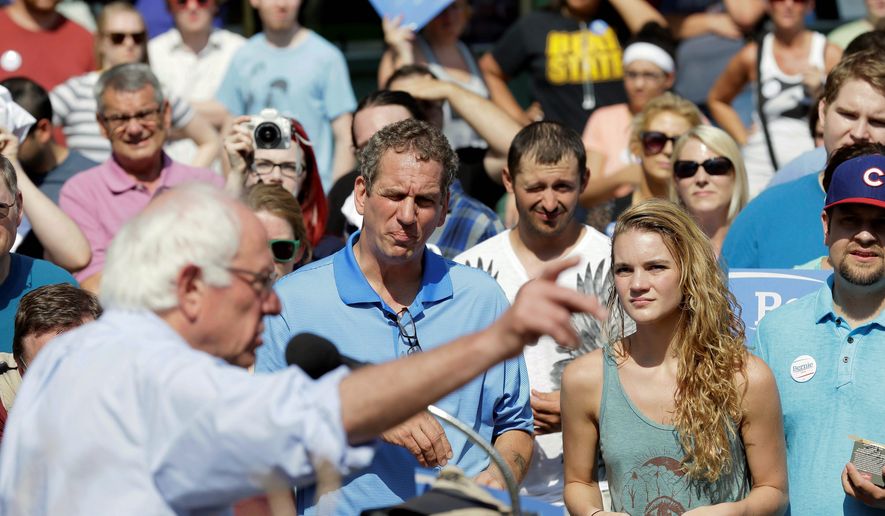To say Sen. Bernard Sanders has struck a chord with Democratic voters in Iowa and New Hampshire would be an understatement, and local party leaders in those key early primary states believe the Vermont senator and self-described socialist’s appeal is growing stronger each day.
Mr. Sanders, who is seeking the White House as a Democrat, has been drawing thousands to recent campaign rallies and has crafted a populist message that centers heavily on themes of income inequality and economic fairness. Political analysts say his pitch, strikingly similar to that of progressive hero Sen. Elizabeth Warren of Massachusetts, is exactly what the progressive wing of the Democratic Party wants to hear from a candidate.
In Iowa, some Democrats suggest the excitement around the senator’s campaign is reaching a fever pitch and, in some ways, may be reminiscent of the energy seen during then-Sen. Barack Obama’s ascension in 2007 and 2008.
“He could probably draw 100,000 people if you could get him into a big enough football stadium,” Larry Hodgden, chair of the Cedar County, Iowa, Democratic Party, said of Mr. Sanders.
“Maybe he’s not a longtime Democrat, but his progressive ideas are the ideas the Democratic Party was built on. He can call himself whatever he wants to call himself,” Mr. Hodgden said.
In Iowa, Mr. Sanders has started to close a once-monumental gap with Hillary Rodham Clinton, the party’s presidential primary front-runner. Just a few months ago, Mr. Sanders was polling in single digits.
Now 31 percent of Democrats say he’s their No. 1 choice. Fifty percent still say they’ll back Mrs. Clinton in the Iowa caucuses, according to a CNN/ORC International Poll released last week.
In New Hampshire, home of the nation’s first primary, Mr. Sanders has pulled ahead of Mrs. Clinton and leads by 7 percentage points, 44 percent to 37 percent, a recent Franklin Pierce University/Boston Herald Poll shows.
His surge in the polls comes as Mrs. Clinton struggles with the growing scandal over her use of a private email account while secretary of state. Federal investigators now have control of her personal email server following revelations she sent classified information from that address — something she had previously denied.
At the same time, other Democrats in the presidential field — former Maryland Gov. Martin O’Malley, former Virginia Sen. Jim Webb and former Rhode Island Gov. Lincoln Chafee — have failed to gain real traction in either Iowa or New Hampshire. Last week’s CNN poll, for example, put each man at 1 percent or lower.
Vice President Joseph R. Biden, who has yet to announce whether he’ll enter the race, garnered 12 percent.
Mr. O’Malley, in particular, has tried to capture the hearts of progressives with a stump speech focused on income equality, an expansion of Social Security, college affordability and other similar issues of importance on the left. But he’s failed to generate the kind of excitement that now surrounds Mr. Sanders.
Mr. Hodgden, for example, said he encouraged Mr. O’Malley to enter the race and expected to support the former governor. With Mr. Sanders’ rise, however, Mr. Hodgden has held off formally backing Mr. O’Malley.
“I haven’t committed to him 100 percent,” Mr. Hodgden said.
Political specialists say there are several reasons behind Mr. Sanders’ exploding popularity. The main factor is that he’s spent his 25 years in Congress building a reputation as a fierce left-wing warrior and, at this point, has more credibility among liberals than any other candidate in the race, according to Matthew Dallek, assistant professor of political management at George Washington University.
“They see Sanders as an authentic progressive, and I don’t know that they necessarily see any of the other alternatives out there as particularly compelling, engaging and authentic in the way Sanders is,” he said. “There’s also a sense that his supporters have — here’s this guy, he’s very smart, he really can be quite eloquent when talking about these issues, and he’s been fighting these battles for a long time. People see it as a fiery authenticity.”
While Mr. Sanders still faces an uphill battle to claim Mrs. Clinton’s spot as party front-runner, he’s started to transcend the Democratic primary and has begun taking more shots at Republican candidates. Over the weekend in Iowa, for example, he mocked GOP primary leader Donald Trump’s wealth.
“There’s Donald Trump. What can we do?” Mr. Sanders said as a helicopter flew overhead during a speech in Des Moines. “I apologize. We left the helicopter at home. It’s in the garage. We forgot to bring it.”
Jokes aside, Democratic leaders say Mr. Sanders is inspiring Democrats in much the same way Mr. Trump is inspiring Republicans — by carefully cultivating a reputation as someone who will say exactly what he thinks and is not overly managed by political consultants or public relations professionals.
“I think there’s something — and you’re going to find this amazing — about both he and Trump that people find real. The packaged politicians that won’t answer questions, that redirect questions, they’ve got their finger in the wind. That’s the No. 1 thing,” said Dave Pollak, chair of the Belknap County, New Hampshire, Democratic Committee.
“But I also think he speaks to issues that resonate with people who feel powerless. You get a feeling of excitement from people who feel like they don’t have a voice. I think Trump does the same thing,” Mr. Pollak said. “They’re both perceived as outsiders to the political mainstream.”
• Ben Wolfgang can be reached at bwolfgang@washingtontimes.com.




Please read our comment policy before commenting.